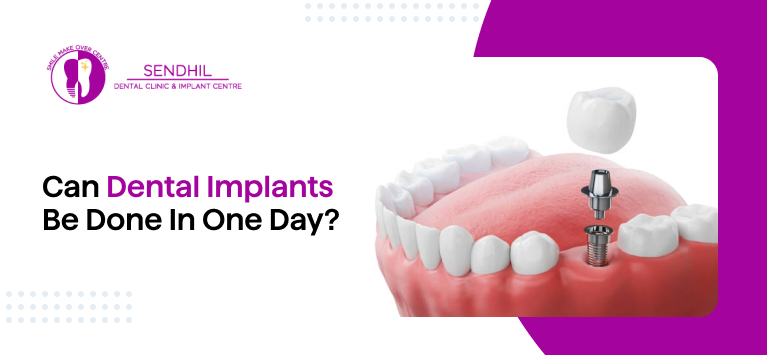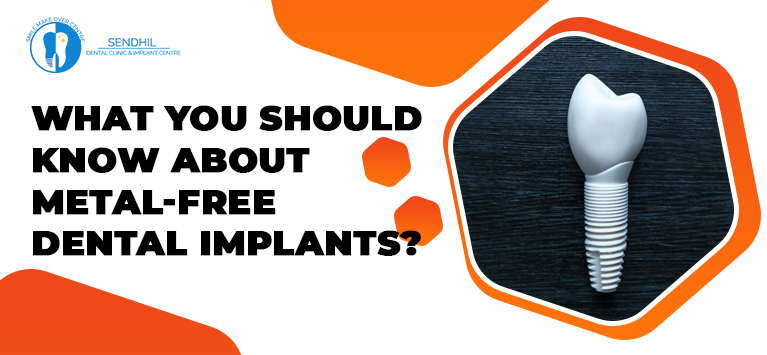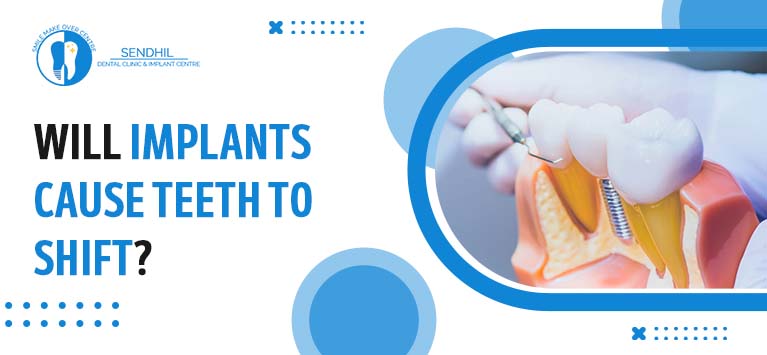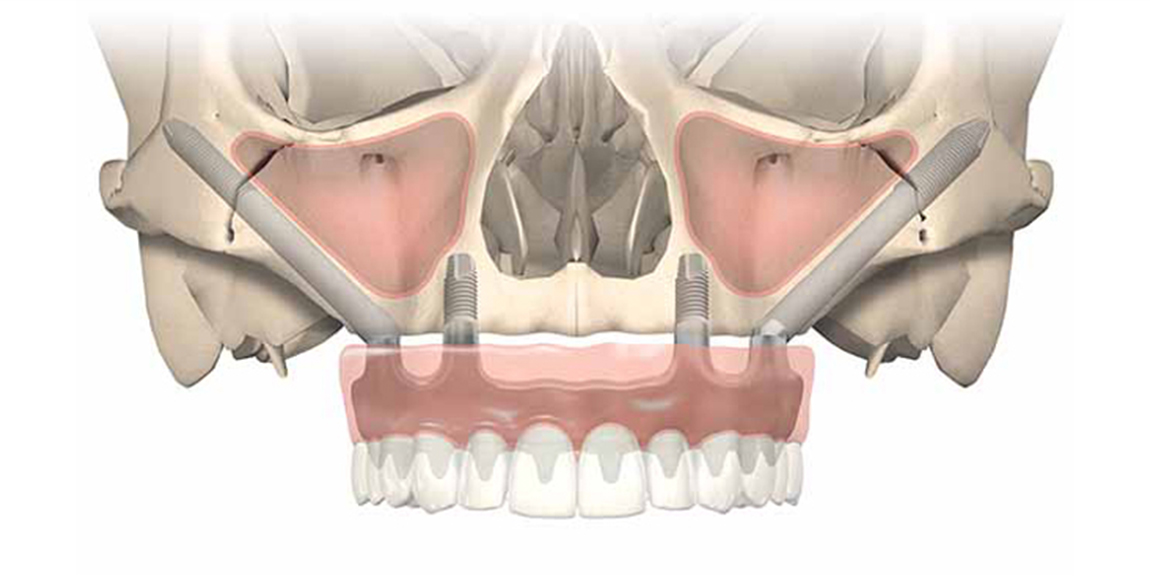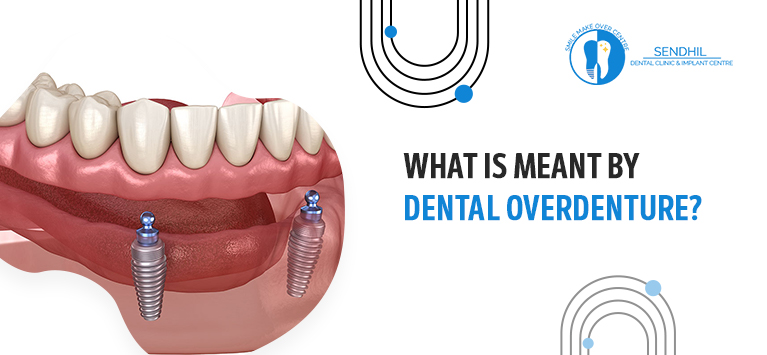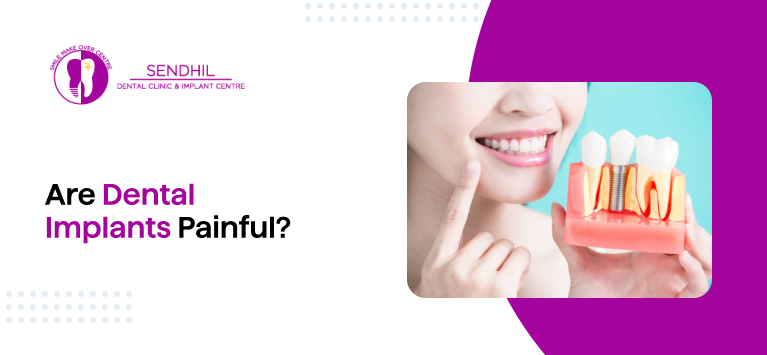
Are Dental Implants Painful?
Dental implants are a popular solution for missing teeth, offering a durable and natural-looking replacement. However, many people worry about whether is teeth implant painful. This blog will address these concerns by explaining the process, what to expect, and how to manage any discomfort effectively.
Table of Contents
Dental Implants
Dental implants are artificial tooth roots, typically made of titanium, that are surgically placed into the jawbone to support a crown, bridge, or denture. They provide a stable foundation and mimic the function of natural teeth. Dental implants are known for their durability, appearance, and ability to prevent bone loss in the jaw.
Am I a Good Candidate for Dental Implants?

Not everyone is a suitable candidate for dental implants. Ideal candidates generally:
- Have healthy gums.
- Have sufficient jawbone density to support the implant.
- Are in overall good health.
Chronic health conditions like diabetes, smoking, or gum disease can affect healing and increase the risk of complications. Your dentist will evaluate your medical and dental history to determine if dental implants are right for you.
Are Dental Implants Painful?
The answer is no; dental implants are not painful during the procedure because of anesthesia.
The dental implant procedure may sound intimidating, but it’s performed under local anesthesia or sedation, ensuring you don’t feel pain during the surgery. While the thought of drilling into the jawbone might seem scary, patients typically only experience pressure, not pain, during the procedure.
After the anesthesia wears off, it’s normal to experience mild discomfort, but it’s usually manageable with over-the-counter pain medications. Modern techniques and advancements in dental implantology make the procedure much less invasive and painful than many assume.
What Causes Pain After Implants?
While the procedure itself is painless, some discomfort is expected during the healing process. Common causes of pain include:
- Surgical site sensitivity: The tissues and bone around the implant need time to heal.
- Swelling or bruising: These are normal side effects of oral surgery.
- Pressure on the implant: The implant site may feel tender due to the adjustment of surrounding tissues.
In most cases, this discomfort is temporary and gradually improves within a few days.
Pain After a Dental Implant
The level of pain after a dental implant varies from person to person. You might feel mild soreness, swelling, or tenderness for a few days. This pain is similar to what you’d experience after other dental procedures, like tooth extractions.
If pain persists or worsens, it could be a sign of complications such as infection, improper placement of the implant, or pressure on the surrounding nerves. It’s important to communicate with your dentist if you experience intense or prolonged discomfort.
How Long Will the Pain Last After Getting a Dental Implant?
Mild discomfort is common for the first 3–5 days after the procedure. Swelling and tenderness may persist for up to 7-10 days but should improve with proper care.
In some cases, a dull ache might linger for a few weeks as the bone heals around the implant in a process called osseointegration. However, significant or worsening pain after this period is not normal and should be addressed immediately by your dentist.
How to Reduce Pain and Discomfort After Dental Implants
Managing pain and speeding up recovery is possible with the following tips:

- Follow your dentist’s instructions: Stick to prescribed medications and care routines.
- Apply cold compresses: Reduce swelling by applying ice packs to the outside of your cheek for 10–15 minutes at a time.
- Eat soft foods: Avoid hard, crunchy, or spicy foods that may irritate the implant site.
- Practice good oral hygiene: Gently clean the area as directed to prevent infection.
- Rest: Allow your body to heal by avoiding strenuous activities.
These simple steps can significantly ease discomfort and promote healing.
Throbbing pain after dental implant
Throbbing pain after dental implant is not uncommon but can indicate several issues, including:
- Infection: Poor oral hygiene or bacteria can lead to an infection at the implant site.
- Nerve damage: Rarely, an improperly placed implant can put pressure on surrounding nerves.
- Overloading the implant: Chewing hard foods too soon can stress the implant.
- Sinus issues: For implants in the upper jaw, sinus pressure or damage can cause discomfort.
If throbbing pain after dental implant persists or worsens, contact your dentist promptly to identify and address the underlying cause.
What To Do If Dental Implant Pain Persists After 2 Weeks?
Tooth implant pain after two weeks is not typical and could signal complications such as:
- Implant failure: If the implant doesn’t fuse properly with the jawbone, it may become loose.
- Peri-implantitis: An infection around the implant can cause pain and inflammation.
- Bone rejection: Rarely, the body may reject the implant material.
If you experience pain after two weeks, schedule an appointment with your dentist for a thorough evaluation. Early intervention can prevent further complications and ensure the success of your implant.
What should you do if you experience pain months or years after a dental implant?
Pain months or years after a dental implant can result from several issues:
- Peri-implantitis: Infection of the gums or bone around the implant.
- Implant failure: The implant may not integrate properly with the bone or become loose over time.
- Nerve damage: Caused by improper implant placement.
- Sinus problems: Occurs when upper jaw implants affect the sinus cavity.
- Overloading or grinding: Excessive force on the implant due to teeth grinding or an ill-fitted crown.
Conclusion
Are dental implants painful? The answer is no. Dental implants are a safe and effective way to replace missing teeth. While mild pain and discomfort are normal after the procedure, they are manageable and typically short-lived. Following your dentist’s aftercare instructions and addressing any persistent pain promptly will help you achieve a successful and pain-free recovery. If you’re considering dental implants, don’t let fear of pain hold you back—modern advancements have made the process much more comfortable than you might expect.


